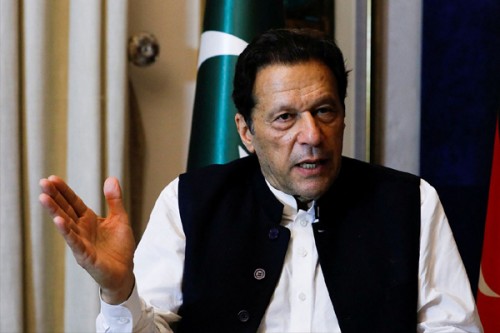Imran Khan's political future now hangs by a thread

Islamabad, May 16 (IANS) Pakistan witnessed one of its worst violence, clashes and chaos on May 9 following former Prime Minister Imran Khan's arrest at the Islamabad High Court, which prompted his followers to vandalise and damage sensitive army installations across the country.
The violence that went on for at least 72 hours saw mob attacks on General Headquarters (GHQ) in Rawalpindi, Core Commander house in Lahore, Jinnah House Lahore, Radio Pakistan's Peshawar office, and other government and state institution offices and buildings across the country.
The chaos targeted at state institutions, and the anger among Imran Khan's supporters against the military, has now been linked to the former premier's anti-military stance, open accusation and name calling of senior serving military officials of being behind attempts of assassination on his life.
The Pakistan Army has now decided to show zero tolerance against elements behind these attacks, terming them as a blatant attempt to not only target the institution but also to create a division between the people and the army.
During a special session of the Core Commanders Conference held at GHQ Rawalpindi, Chief of Army Staff General Syed Asim Munir was given a comprehensive briefing about incidents of violence and mob attacks on 9th May onwards as commanders expressed their anguish over the condemnable incidents.
The Core Commanders Conference mutually agreed to not show any restraint if such an attempts like that of 9th May are repeated in the future.
It also decided to show zero tolerance against all culprits behind the attacks, which the armed forces termed as "foreign supported and internally instigated, promoted and provoked against military installations and public/private properties".
The army, without naming Pakistan Tehreek-e-Insaf (PTI) and its chief Imran Khan, has hinted towards arresting all of its supporters, instigated and provoked by him, which has lead to the attacks against the military installations, and initiating trial against them under the anti-terrorism laws of the country.
The army has also decided to initiate the Army Act and the Official Secret Act in some cases as well going forward.
It claimed that it has irrefutable evidence to establish that the attacks were part of a pre-planned strategy, implemented immediately after Khan's arrest.
"The forum was briefed that a well coordinated arson plan involving desecration of Shuhada pictures, monuments, burning down of historical buildings and vandalism of military installations was executed to malign the institution and provoke it towards giving an impulsive reaction," the Inter-Services Public Relations (ISPR) said in a statement.
"These attacks and attempts were made to create distortions in this regard are absolutely futile," the ISPR added.
It is a known fact that Imran Khan has been very vocal about naming and shaming the army chief as well as other senior serving army and intelligence officials.
In his statement on May 9 before leaving for Islamabad from his Zaman Park residence in Lahore, he had lashed out at the military establishment yet again warning them of being ready for the consequences if any attempts to arrest him are made.
Now, with the army geared up to not spare the narrative and respond it with legal cases, Imran Khan's coming days may just be numbered and he may be booked and trialed under the same references.
Under any of the references, if a case against Imran Khan is lodged and he is put to trial under any of the Acts, he may face life imprisonment or capital punishment.

|

|

